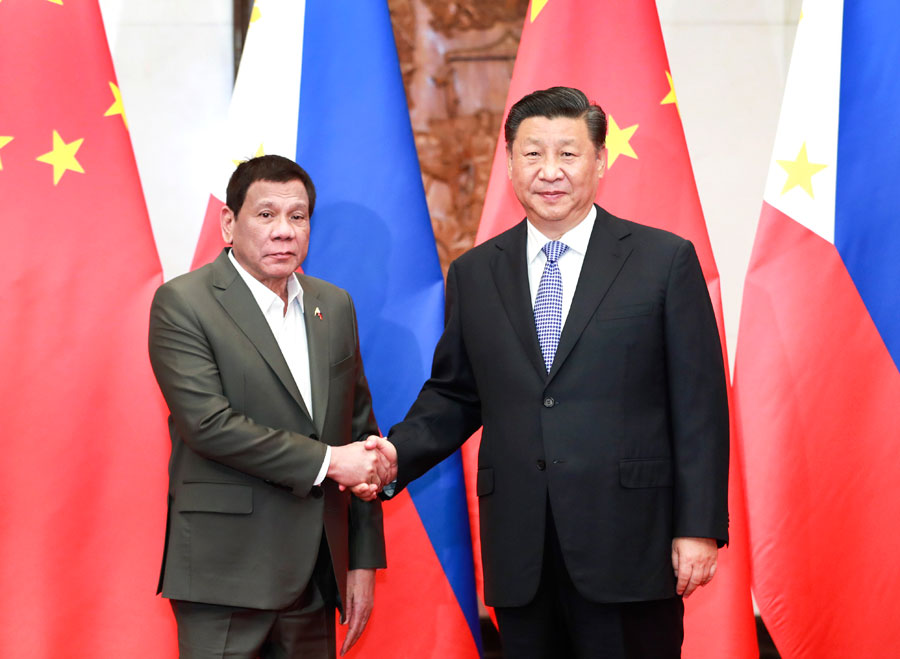
President Xi Jinping meets with Philippine President Rodrigo Duterte at the Diaoyutai State Guesthouse in Beijing on Aug 29. [Photo/Xinhua]
Belt and Road Initiative cited as prime tool for nation to help others develop
When Philippine President Rodrigo Duterte visited China recently — his fifth visit since taking office in 2016 — President Xi Jinping received him at the Diaoyutai State Guesthouse in Beijing and referred to him as "my old friend".
Although differences over the South China Sea remain, the relationship between China and the Philippines has ticked upward in the past three years.
Duterte told Xi he stands ready to work with him to push forward the robust development of the China-Philippines comprehensive strategic partnership for mutual benefit and win-win results. The partnership was established in November last year when Xi made a state visit to the southeast Asian nation.
The Philippines is one example of the partnership diplomacy China uses to strengthen relationships with its neighbors. It is a friendly style that features amity, sincerity, mutual benefit and inclusiveness.
With the spirit of partnership in mind, Xi has guided the nation to build friendly relations with various countries by expanding the convergence of interests with them, said Yang Jiechi, a member of the Political Bureau of the Communist Party of China Central Committee and director of the committee's Foreign Affairs Commission office, in a signed article in the most recent issue of the Qiushi Journal, the committee's flagship magazine.
Acting on Xi's Thought on Diplomacy, China has been expanding its all-around strategic posture in foreign relations and is striving to develop global partnerships, Yang said.
As of June, China had forged partnerships with 110 countries and regional organizations in various forms, including 60 comprehensive strategic partnerships, the Foreign Ministry said.
Besides neighborly relations and partnerships with developing countries, China also emphasizes connections with major countries.
As part of its effort to develop major-country relationships, China has been working to intensify its comprehensive strategic partnership of coordination with Russia; advance the China-US relationship based on coordination, cooperation and stability; and build the China-EU partnership for peace, growth, reform and civilization, Yang said.
It also strives to build a framework for major-country relations featuring overall stability and balanced development, he added.
In addition, China has made consistent efforts to support and develop strategic partnerships with Latin American and Middle Eastern countries, and continues to enhance unity and cooperation with emerging markets and developing countries to build up positive forces for peace and development.
Xi proposed the idea of developing global partnerships in November 2014 at the Central Conference on Work Relating to Foreign Affairs. At the meeting, he underlined the need for China to make more friends while abiding by the principle of nonalignment and to build a global network of partners.
The idea has been frequently mentioned by Xi on international occasions ever since. At the Group of 20 Summit in June in Osaka, Japan, Xi called on members to uphold the partnership spirit and resolve differences properly.
"Given the different development stages of G20 members, it is only natural that we may have diverging interests and views on some issues," Xi said. "The important thing is to always promote partnership and treat each other with respect and trust, and in that spirit engage in consultation as equals, manage differences while seeking common ground and build greater consensus."
Zhou Fangyin, a China foreign policy researcher at the Guangdong Institute for International Strategies, said developing global partnerships is China's peaceful approach to the pursuit of development in the existing international system.
Different from alignment, which some countries seek as way of boosting alliances and security, Zhou said, China's partnership diplomacy pursues all-around cooperation in such areas as economy, politics, diplomacy and security. Partnership is crucially significant for addressing the common challenges facing the world, given the rise of unilateralism and protectionism, he said.
To build a global network of partners, China proposed a new type of international relations underpinned by mutual respect, fairness, justice and win-win cooperation. It put forward and followed a policy of upholding justice and pursuing shared interests and championed a new vision featuring common, comprehensive, cooperative and sustainable security, he said.
Wang Lian, a professor at the School of International Studies at Peking University, said China is firm in its resolve that all countries, regardless of their size, strength or level of development, are equal members of the international community, and it supports the multilateral system, which has the United Nations at the core.
This position reflects the universal consensus of most countries in the world, and conforms to the common interests of the international community, Wang said.
He said China has made consistent efforts to improve the global partnership network with a view toward working with other countries to strive for shared, sustainable, win-win development through joint contributions, which in turn will lead to development opportunities for all.
|






7740f3b5-9ecb-438e-9052-76cb2d4bb671.jpg)

